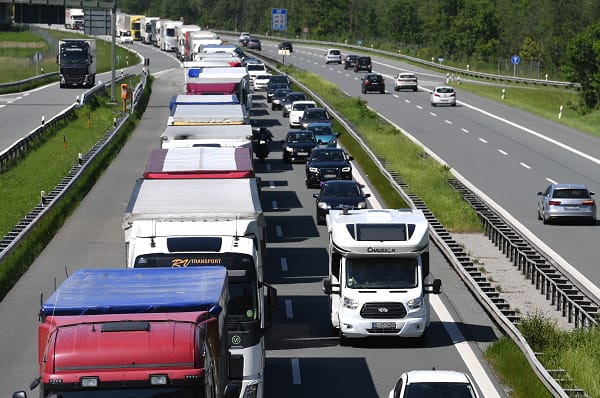#supply-chain-risk
#supply-chain-risk
[ follow ]
#cybersecurity #anthropic #pentagon #national-security #tariffs #jaguar-land-rover #business-continuity
fromSecurityWeek
15 hours agoFour Risks Boards Cannot Treat as Background Noise
Rather than stolen data making headlines, it was business stoppage that triggered attention. Moving into 2026, the board's focus should be on ensuring business continuity and building resilience in the face of emerging risks generated by AI usage and attack vectors, quantum computing and geopolitics.
Information security
Information security
fromDevOps.com
18 hours agoSecurity Flaws in Anthropic's Claude Code Risk Stolen Data, System Takeover - DevOps.com
Three critical vulnerabilities in Anthropic's Claude Code allow attackers to execute arbitrary commands, steal API keys, and take over systems by simply cloning untrusted projects, shifting supply chain risks from code to configuration files.
Information security
fromThe Hacker News
1 week agoGoogle Links China, Iran, Russia, North Korea to Coordinated Defense Sector Cyber Operations
State-sponsored and criminal actors from China, Iran, North Korea, and Russia target the defense industrial base, prioritizing drones, hiring exploitation, edge-device access, and supply-chain risk.
fromTechRepublic
1 month agoEU's New Cybersecurity Act Could Ban High-Risk Suppliers - TechRepublic
Yesterday (Jan. 20), the Commission unveiled its revised Cybersecurity Act proposal after months of behind-the-scenes negotiations that reportedly caused substantial friction between officials and member states. This sweeping update introduces measures to identify and potentially exclude "high-risk" third countries and companies from Europe's critical digital infrastructure across 18 essential sectors, including energy systems. As cybersecurity threats continue rising since the original Act took effect seven years ago, the EU is essentially drawing new battle lines in the global tech landscape.
Information security
Information security
fromComputerWeekly.com
1 month agoCyber body ISC2 signs on as UK software security ambassador | Computer Weekly
ISC2 joined the UK Software Security Ambassador Scheme to advise on promoting secure-by-design practices and supporting adoption of the Software Security Code of Practice.
fromBusiness Insider
1 month agoSaks owes hundreds of millions to luxury brands from Chanel to Burberry
"There will be a lot of hardship for those brands," Gary Wassner, the CEO of Hilldun Corp., which acts as a guarantor or insurer for brands, told Business Insider about independent designers who aren't part of a big conglomerate or use factoring firms, like Hilldun.
Business
fromComputerWeekly.com
2 months agoIT Sustainability Think Tank: How IT sustainability entered the mandate era during 2025 | Computer Weekly
As the calendar turns the final pages on 2025, the information technology sector stands at a critical juncture regarding its environmental commitments. This year was not marked by technological breakthroughs solving decarbonisation, but by the decisive maturation of sustainability from a strategic differentiator into an operational and regulatory imperative. This transition involved a painful reckoning with data complexity, supply chain reality, and the sheer energy appetite of modern computing, driven primarily by the rapid proliferation of artificial intelligence (AI).
Environment
from24/7 Wall St.
2 months agoFord (NYSE: F) Price Prediction and Forecast 2025-2030 (December 2025)
Shares of Ford Motor Company (NYSE: F) gained 6.13% over the past month after gaining 9.65% the month prior. The legacy automaker's stock has gained more than 57% since its YTD low on April 8. So far this year, Ford is up 41.66%. It continues to pay patient shareholders with a dividend currently yielding 4.39%, or 15 cents per share quarterly.
Business
Artificial intelligence
fromFortune
2 months ago'2026 has to be a year of execution': AI investment pressures, supply-chain risks, and strategy misalignment are all on the line for CFOs | Fortune
Finance leaders must replace debate with data-driven execution in 2026 to address AI investments, supply-chain vulnerabilities, geopolitical disruption, and stakeholder misalignment.
from24/7 Wall St.
2 months agoFedEx and UPS Face Plane Groundings at the Worst Possible Time
Lee opened the conversation by pointing to the timing of the cargo-plane crisis. Just as peak shipping season begins, both FedEx and UPS have had to pull aging aircraft from service following a tragic explosion. I told him this type of shock is exactly what investors overlook until it hits the tape. These older planes are workhorses of global distribution networks. When they suddenly disappear from circulation, the financial damage can be immediate.
Business
fromBitcoin Magazine
3 months agoBitcoin-miner Bitmain Is Facing Federal Investigation Over National Security Issues
The inquiry, dubbed "Operation Red Sunset," led by the Department of Homeland Security, reportedly examined whether the company's machines could be remotely manipulated for espionage or sabotage of critical US infrastructure. Bitmain denies these capabilities, but investigators have reportedly tested its equipment at ports and dissected chips and code to assess potential threats. The company's hardware has long attracted scrutiny. A 2017 Bitcoin Magazine report suggested Antminer devices contained code allowing remote shutdown, which Bitmain said was a theft-prevention feature later patched.
US politics
fromThe Local Germany
3 months agoInside Germany's rare earth treasure chest
In a World War II bunker east of Frankfurt, a steel door weighing over four tonnes protects Germany's largest reserve of rare earths, a treasure at the heart of rising geopolitical tensions. The exact location of the bunker is confidential and the site is under close video surveillance. This is where Tradium, a German company specialised in trading rare earths, keeps thousands of barrels of the precious materials - almost all from China, the world's biggest producer.
Miscellaneous
Information security
fromTechCrunch
4 months agoWiz chief technologist Ami Luttwak on how AI is transforming cyberattacks | TechCrunch
AI adoption and vibe coding expand attack surfaces as both developers and attackers use AI tools, causing insecure implementations, prompt-driven exploits, and supply-chain risks.
fromTechCrunch
5 months agoJaguar Land Rover to pause production until next week - at least | TechCrunch
Luxury car-maker Jaguar Land Rover will not resume production at its factories for yet another week as it continues to grapple with fallout from a cyberattack. In early September, the Jaguar Land Rover stopped production at its factories in the U.K. after it was impacted by a cyberattack in which hackers stole company data. Jaguar Land Rover has not said what data was stolen.
Information security
Information security
fromThe Hacker News
5 months agoWeekly Recap: Bootkit Malware, AI-Powered Attacks, Supply Chain Breaches, Zero-Days & More
CISOs must prioritize preserving institutional trust and business continuity by securing complex relationships, supply chains, and adapting to AI-driven attacks and regulatory changes.
fromTheregister
5 months agoAI-powered penetration tool downloaded 10K times
Villager, a new penetration-testing tool linked to a suspicious China-based company and described by researchers as "Cobalt Strike's AI successor," has been downloaded about 10,000 times since its release in July. The package, published on Python Package Index, operates as a Model Context Protocol (MCP) client and integrates multiple security tools. It includes Kali Linux, which legitimate defenders use to automate penetration testing, and it contains hundreds of tools that can also be used to launch cyber attacks at scale.
Python
fromSecuritymagazine
5 months agoCritical Steps to Strengthening Satellite Network Security
Satellite networks are integral to myriad aspects of modern society, providing essential services that support both civilian and military operations. As our dependency on satellite networks has increased, so has the risk of cyber threats targeting these critical infrastructures. Any disruption of satellite services can negatively impact everything from emergency response systems to financial transactions to navigation. That makes ensuring the cybersecurity of satellite networks essential to maintaining global stability and security.
Information security
fromBusiness Matters
5 months agoClear Insurance Management Advises Retailers to Boost Security Measures Post M&S Cyber Scare
In the recent M&S breach, only £100 million of cyber insurance was in place, far short of the £300 million in damages incurred, leaving the retail giant significantly underinsured. With more retailers relying heavily on online operations and third-party platforms, the financial impact of operational downtime from data breaches can be severe and widespread. Yet many businesses still lack adequate-or any-cyber insurance.
Information security
fromTheregister
5 months agoFrostbyte10 bugs put grocery refrigeration devices at risk
Ten vulnerabilities in Copeland controllers, which are found in thousands of devices used by the world's largest supermarket chains and cold storage companies, could have allowed miscreants to manipulate temperatures and spoil food and medicine, leading to massive supply-chain disruptions. The flaws, collectively called Frostbyte10, affect Copeland E2 and E3 controllers, used to manage critical building and refrigeration systems, such as compressor groups, condensers, walk-in units, HVAC, and lighting systems. Three received critical-severity ratings.
Information security
[ Load more ]









